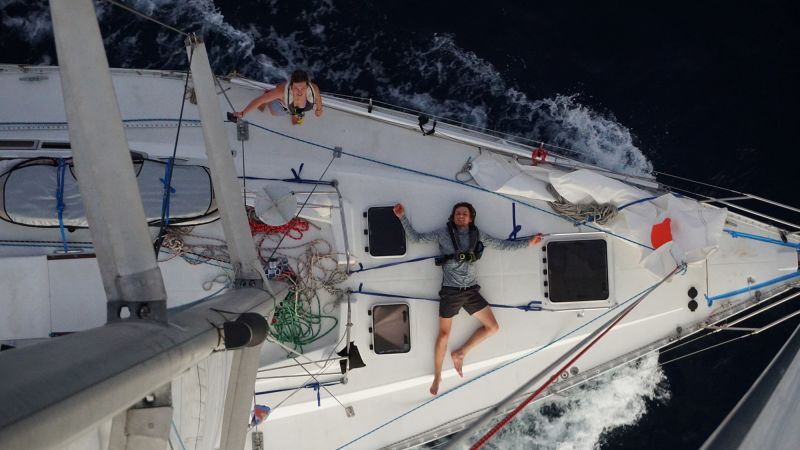(CNN) — The 50-foot sailboat bashed against huge Pacific waves as it beat a course upwind. The few cruise ships that were visible on the horizon soon disappeared, and seasickness set in, leaving a few among the crew doubled over with each crest and trough.
The boat slammed down so violently at one point that the microwave door in the galley snapped off. For those who still had an appetite, their chili dinner would be served cold.
The group of friends sailing the boat, who were all in their mid-20s, were a long way from their desk jobs in California’s tech industry. Just months before, the money had been rolling in like a high tide — but something was missing.
A carefully laid plan had led them to this moment — setting a course for adventure on the high seas as they sailed their newly purchased and freshly updated sailboat out of port in Cabo San Lucas, Mexico.
Destination: the Marquesas Islands in French Polynesia, half an ocean away.
Objective: to make the most of their youth and good fortune while they’re healthy and able.
The voyage would teach these young people high-stakes life lessons that you can’t learn within the confines of an office. And they owed it all to daring to take a “mini retirement” together.
Never heard of it? The term refers to taking a break from employment — often early in a career’s trajectory and often quite early in life, too — with the intent of returning to the working world later.
“I hate the idea of waiting until I’m older to chase experiences beyond the keyboard,” says Lauren Sanders, 24, one of the sailors who left her tech job behind to make the Pacific crossing. “And if these experiences are going to shape and improve the person I am, why not chase them as soon as possible?”
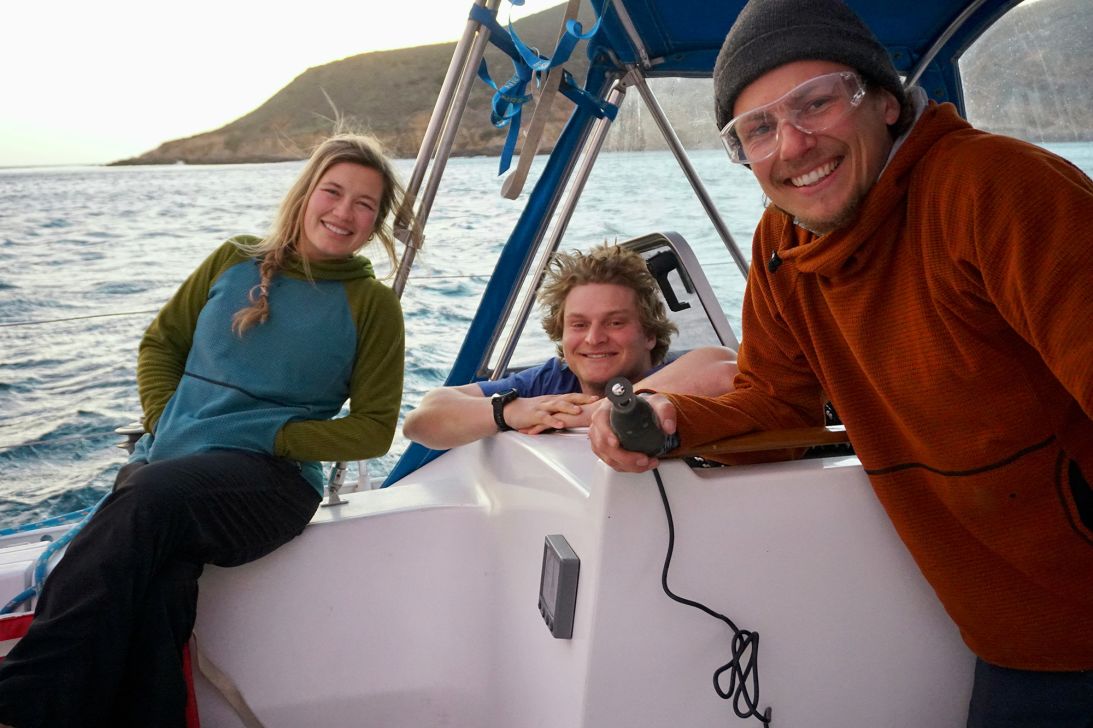
It was the ocean that originally helped forge the friendship between Lauren Sanders, Jack Elliott and Ted Lewitt. Jack and Ted were roommates at the University of California Santa Cruz, both originally from Colorado, who took up surfing in college. At the UCSC surf club, they met Lauren, who had grown up surfing in California.
They made the most of their coastal location, expanding their surfing horizons with trips to Costa Rica and Hawaii. They started sailing together, too, along the California coast on a small boat Elliott and Sanders purchased after graduating and on a charter in the Caribbean.
But even as they tried to keep chasing the waves, they had also entered the demanding world of tech employment. Sanders says she had “jumped in at the deep end” of the creative tech world, working as a product manager for a software startup with undefined hours that usually involved hopping on Slack first thing in the morning while she was still in bed.
“I poured most of my energy into work. It was exhausting and invigorating,” she says. At the time, she was sharing an apartment in Santa Cruz with Elliott, who by then had become her boyfriend, and Lewitt, who were likewise entrenched in the tech culture of long hours.
Elliott worked at several startups that involved many late evenings, endless meetings and feeling constantly “fried.” A stint he had with an AI-assisted telehealth company was particularly soul-sucking, he says.
“The killer part for me was not the volume of the work, but the impact of it — I felt like we spent a ton of time and resources chasing after customer requests that didn’t actually make our patients healthier or their experience better,” says Elliott, now 26.
The paychecks were substantial — while the three didn’t want to specifically disclose their incomes, they were all earning salaries somewhere in the six figures, and put tens of thousands of dollars into the boat they would purchase together.
While Sanders says she loved the tech “grind,” she soon found herself craving the “level of growth” that nature provides, which she had grown used to from surfing and working as a river guide in college. She started squirreling away more money to make a big lifestyle change.
The goal, which grew from a kernel of a dream Elliott had been mulling for years, hinged on coming up with the funds to purchase a sailboat that could weather a Pacific crossing and help the friends chase the freedom and challenges they were craving.
“We didn’t have many years out of college to save up, but personally, I have been socking away cash from odd jobs since I was 10 in a shoebox labeled ‘Lauren’s Adventure Savings,’” says Sanders. “All of our tech job paychecks that weren’t going to our Santa Cruz apartment rent went into the boat.”
Elliott credits “The 4-Hour Workweek” by Timothy Ferriss for inspiring him to chase the goal he’d had since college of sailing across the Pacific to the Marquesas Islands, located about 900 miles northeast of Tahiti.
“He points out really well that when you’re young, you have time and health but no money,” says Elliott. “Traditionally, when you’re middle aged, you have money and health but no time. And then you retire and you have no health, right?”
These young people are not alone in their desire for an extended break. People of a certain generation with some savings are embracing mini retirement in a big way right now, says Sabrina Grimaldi, editor and founder of Zillenial Zine, an online publication targeting the micro-generation between Millennials and Gen Z.
Similar to the gap year that some young people take between high school and college, or an academic sabbatical, the extended break is popular, Grimaldi says, with younger people who are looking for new ways to set boundaries between work obligations and leisure time.
“Work-life balance is so important to my generation. We’re working to live, not living to work,” she says.
And when boundaries are tested and the pressure ratchets up, mini retirement can help.
“It may seem ridiculous to some older people that we are already ready for a break from work while we’re so young, but managing your mental health and preventing burnout is so important,” Grimaldi says. “If you don’t do it now, when will you?”
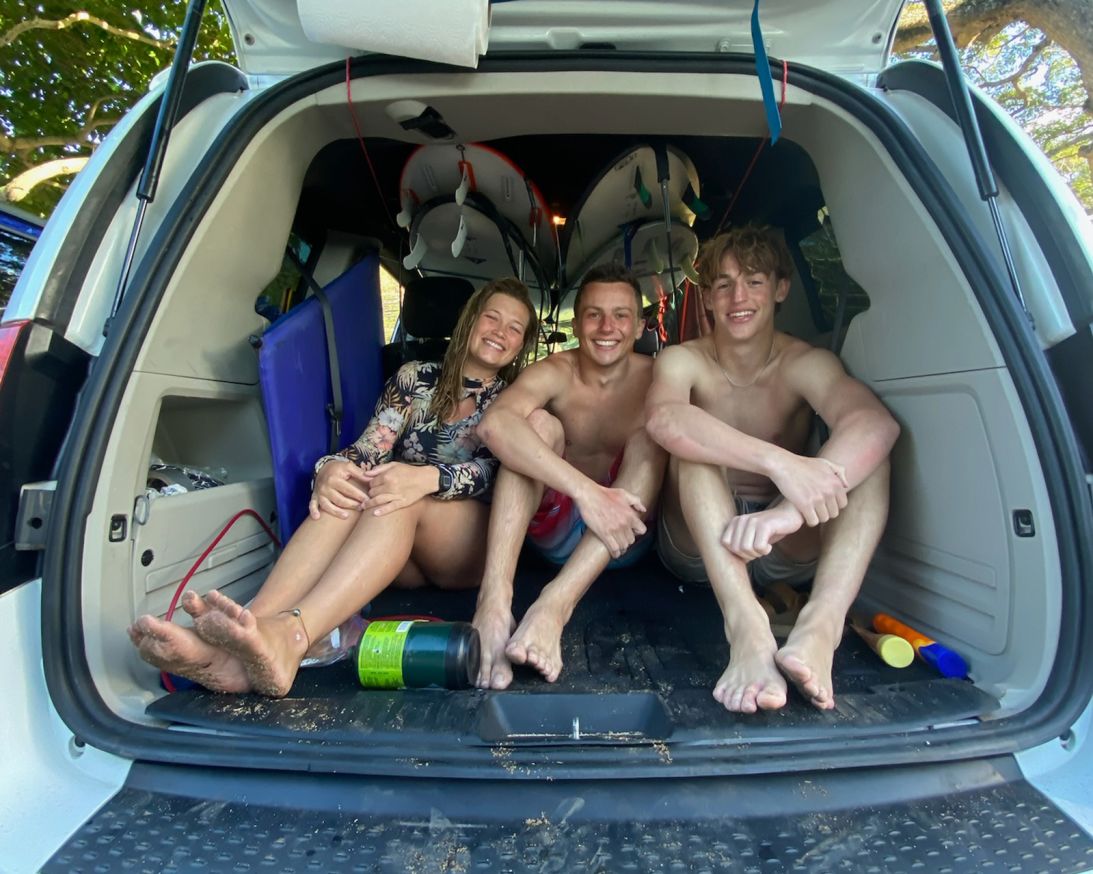
This trio of tech professionals was feeling some of that work-life balance slip away.
With their limited vacation time, Eilliott and Sanders decided to head to the British Virgin Islands in 2022 for a week-long sailing trip with friends, inviting Lewitt along.
Lewitt, who graduated with an electrical engineering degree, was working up to 50 hours a week at a job that involved helping autonomous vehicles detect traffic lights on the road. The job wasn’t particularly stressful, the money was good and he loved his boss. The main drawback was a 45-minute commute each way between Silicon Valley and Santa Cruz three days a week.
He’d been out on Sanders’ and Elliott’s boat around Los Angeles before, but the British Virgin Islands trip shifted his perspective.
“That was my inception point,” Lewitt, now 26, says. “I was like, ‘Oh, you can sail between these places, get a beer, and the water is incredibly warm.’ That’s what got me hooked on tropical sailing. I was like, ‘How do we do more?’”
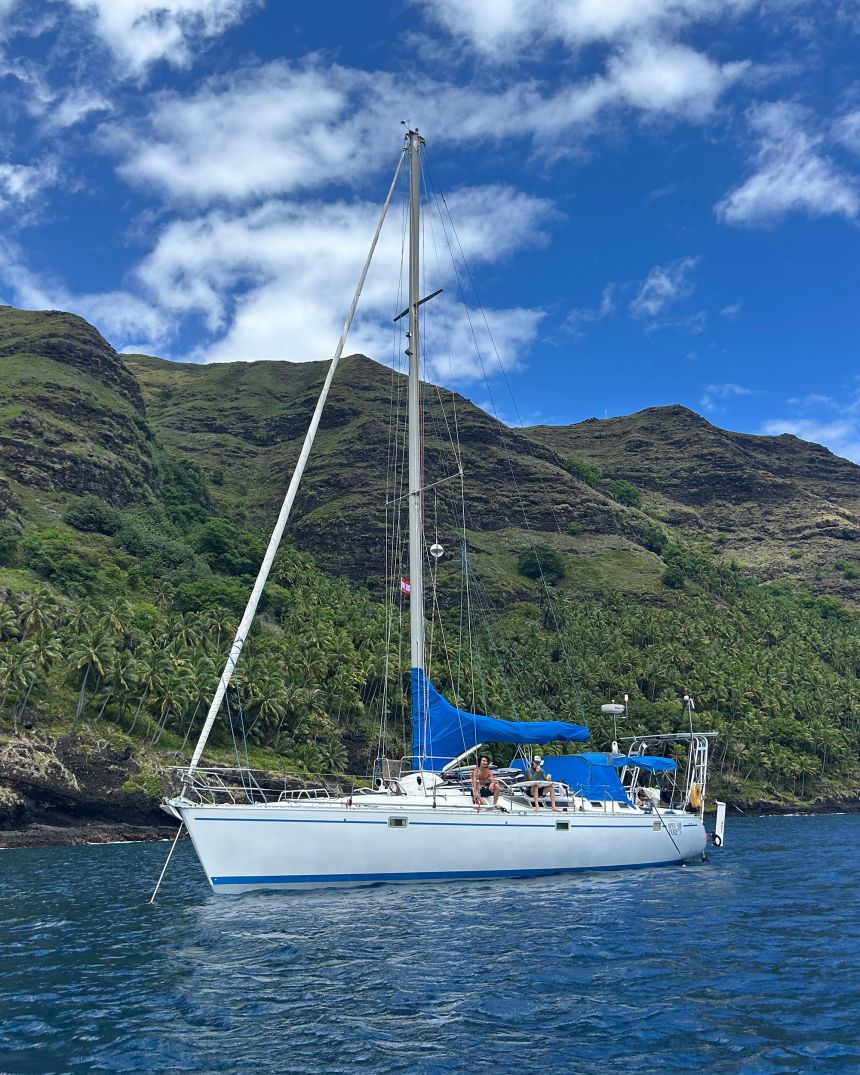
He figured the next step might be for the group to fly to another part of the world and rent a boat for a week to explore someplace like Fiji or Tahiti. “But Jack and Lauren had bigger ambitions,” Lewitt says.
Those ambitions culminated this spring with the Pacific crossing.
The voyage in April to French Polynesia from Mexico took 23 days and covered over 2,600 nautical miles.
The trio had invited another buddy, Pat Rabin, also from their surf club days, to join them for the adventure (he “bought in,” contributing roughly 5% toward the boat’s purchase). Another friend from college, Andrew Huang, joined at the last minute for the crossing between Mexico and the Marquesas to provide another set of eyes and hands on deck.
After the intense winds and waves the group faced right out of port in Cabo San Lucas, their boat, a 50-foot-long monohull they’d christened SV Open Range, finally caught the trade winds.
The friends settled in for long days and nights on watch with the vast Pacific Ocean all around them and the Milky Way streaking across the sky at night.
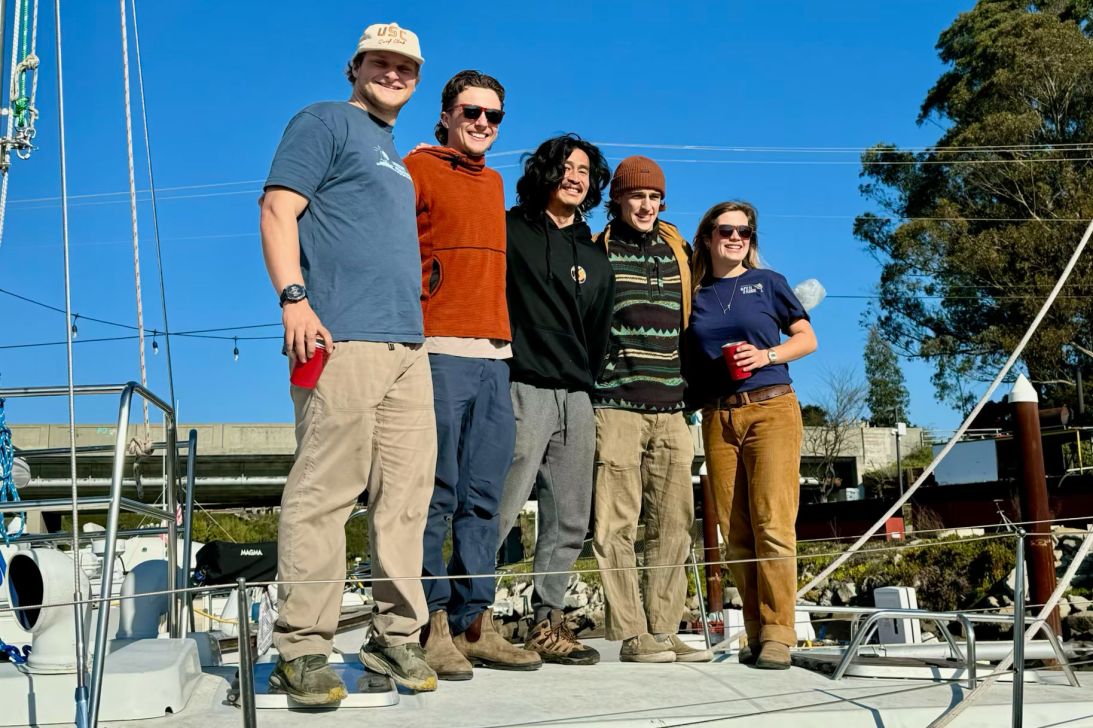
Yet the three-week crossing was only one small leg of the longer journey to realize their shared dream. The three friends approached planning for the trip like it was another job, says Elliott, using task management software and PowerPoint presentations.
A year before they quit their employment and bought their sailboat, the trio started holding what they called “Marquesas Mondays” Zoom meetings to fit the puzzle pieces of a Pacific crossing into position.
They’d take turns presenting on topics like what fire extinguishers to buy, the best routes to sail and what personal protective gear they’d need. They also asked experienced sailors they met through sailing clubs and strangers they contacted through Instagram to share knowledge with them during the Zoom meetings.
“People loved sharing — and that young people like us were doing this. They were like ‘I wish I was doing this at your age’ and were happy to share their wisdom,” says Sanders.
In September 2024, after nearly a year of Zoom meetings and extensive research, they finally found a 1990 Beneteau 50 for sale online. The sailboat and the seller were both located in California.
The friends put the boat through its sea trials, made the purchase and christened her.
The adventure required no small sum of capital to purchase the boat and to upgrade it to their liking. Graduating without student loan debt and landing well-paying jobs right out of school helped the friends launch their ambitious endeavor.
They chose to buy a more expensive boat than was necessary because they wanted a very capable sailboat upgraded for safety, says Elliott. They hope to sell the vessel later for more or less what they paid for it, noting that his “future solvency is definitely closely tied to (selling) the boat.”
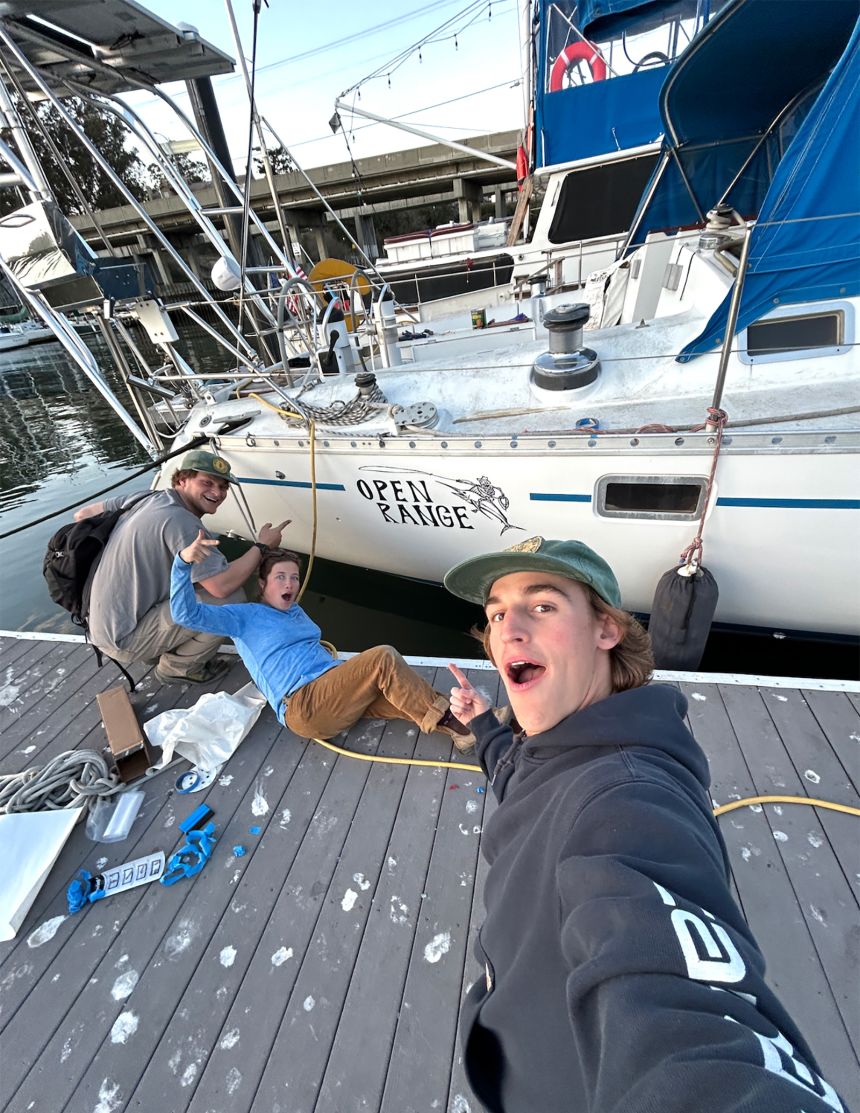
If you can afford to have the boat money tied up until the vessel is sold again, he says, “it’s really possible to do the whole trip for way cheaper than spending a year at home.” Once SV Open Range set sail, the expenses came to around $650 per month per person, including $80 for diesel, dinghy gas and propane; $300 for food; $80 for Starlink and the rest on assorted customs fees and insurance.
In Santa Cruz, for comparison, the three had been trying to live frugally by sharing a two-bedroom place with a tiny bathroom. Elliott said that before discretionary expenditures, his monthly expenses for rent, food, car payments and insurance and utilities were $1,700 a month.
The group fully acknowledges the privilege of being in the position to take an extended break. They were fortunate to have been able to choose “interesting, skilled careers” that allowed them to save up quickly, says Elliott. He feels the experience will only add to his “identity capital” and help him stand out to future employers.
The three’s abilities are likely to stay in demand, he says, and they can crash with their parents if they need help getting their feet back on the ground.
From the start, Sanders says her family of experienced sailors was completely supportive. Elliott’s parents had some reservations but were behind him “in a bit of an ‘I wouldn’t do that but we’ll love you no matter what’ kind of way,’” he says. Lewitt’s parents were concerned but came around once it was clear the voyage was moving ahead.
Lewitt nods to the sheer luck of his upbringing. “Almost all of my coworkers came to the US for grad school and now have families and have made huge sacrifices in their lives to get to work in Silicon Valley,” Lewitt says. “I am uniquely lucky to have such a lottery ticket of a childhood in the US to be able to put my savings towards a fun adventure versus family back home.”
Lewitt and Elliott left their jobs in December to prepare for the trip full-time. The start-up Sanders was working for had already gone under in July — with no severance pay, she says — so she was fully committed even earlier.
With their job-based health benefits gone, the friends got interim health insurance through Covered California plans, which cover people who are no longer working, as well as DAN Travel Insurance, which covers sailors for hospital stays, for the trip.
The purchase of SV Open Range last year kicked off a flurry of preparations to update the boat for “21st century” sailing,” says Lewitt, who found working with his hands to be a great escape from all the screen time at his desk job.
The crew took on most of the labor themselves of installing things like solar panels and a water system to convert saltwater to fresh, in addition to a slew of other repairs and electrical upgrades.
The learning curve going from a small boat sailing the California coastline to a larger one ready to cross the Pacific was enormous, says Sanders.
“All of a sudden we had this huge diesel (engine) we’d never worked with, and we were painfully slow at figuring all the stuff out,” she says. “We used Chat GPT and Google reverse images searches to figure out a lot of what was going on with the boat.”
They eventually managed to find a couple who had previously owned the boat who proved very helpful in learning about SV Open Range’s systems and quirks.
February 1, 2025, was the date they’d set in stone for their departure from California. After a send-off celebration in port near Santa Cruz, the friends threw off the lines and headed south.
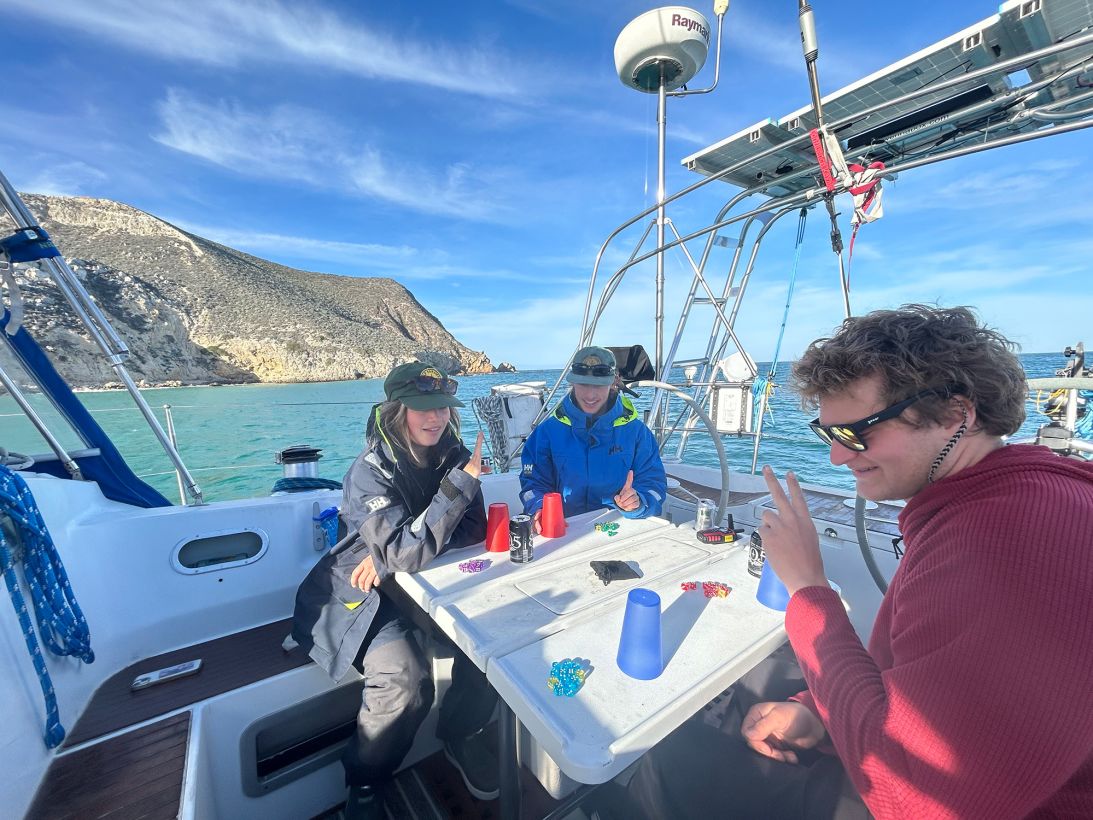
They spent two months sailing down the coast of California and Mexico to Cabo San Lucas, ironing out problems along the way — and sneaking in surf sessions wherever they had the time.
“We were trying to break as much as we could, sailing as much as possible, seeking out wind and waves, while we still had access to supplies,” says Sanders.
They embarked from Cabo San Lucas on April 3. The 23-day journey to the Marquesas was both thrilling and exhausting.
There were lots of highs and lows, detailed with plenty of personality by the crew on their log. One entry from the crossing on Day 12 titled “Black Hole Sun” offers a snapshot of the conditions:
It’s hot enough to fry an egg on the solar panels.
It’s hot enough that the dinner chef needs a headband because of how much he or she sweats while cooking.
It’s hot enough to sunburn your back in <10 minutes of direct exposure.
It’s hot enough our water tanks are within a few degrees of the hot water heater output.
And then the sun rises!
There were long days like this one pushing through the doldrums, under the hot equatorial sun, before finding the southern trade winds. There were rainbows galore and night watches dodging squalls with the menace of lightning flashing on the horizon.
The friends rationed Oreos (two cookies per person, after dinner each day), tore through scores of books, had mandolin singalongs under the stars and hooked massive yellowfin tuna to turn into sashimi and tacos.
When they crossed the equator on day 15, they celebrated with a steak taco meal they’d been rationing since leaving Mexico and leapt off the stern for a swim in crystal clear water some three miles deep. At one point, when a sailfish flashed by in the blue, they took it as an auspicious sign (they had a decal of the fish applied to the side of SV Open Range before they set out).
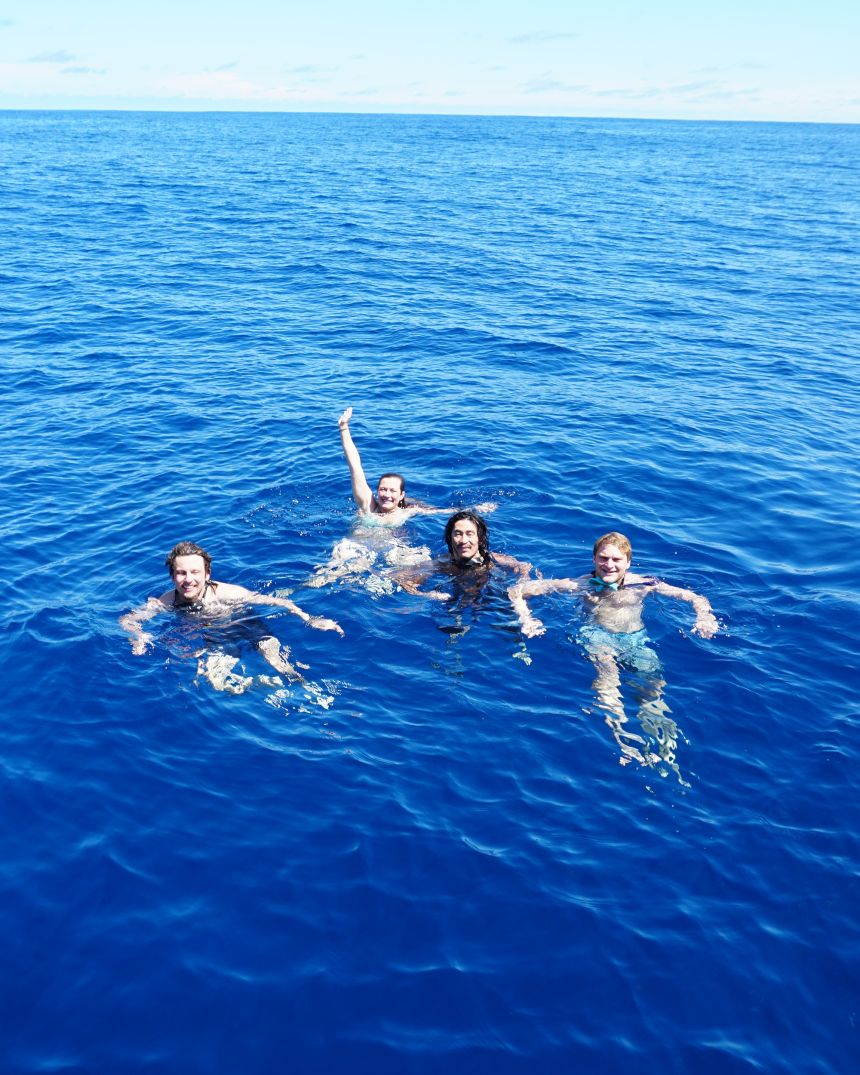
For Elliott, crossing the equator felt like the first true accomplishment of the trip — “one of those moments where you zoom out and realize how crazy of a moment you are in.”
By the time they made it to the Marquesas on April 26, Sanders said they sensed land before catching sight of the island of Fatu Hiva.
“I was giddy. I never knew what land smelled like,” she says. “It smelled like juice, earth, and victory. I knew we had made it.”
To Lewitt, land carried the sweet smell of honeysuckle, a welcome contrast to the odors of diesel and the marine toilet that had dominated the prior months.
It was impossible to forget the view from the helm, Sanders says, as she steered SV Open Range into the Bay of Virgins.
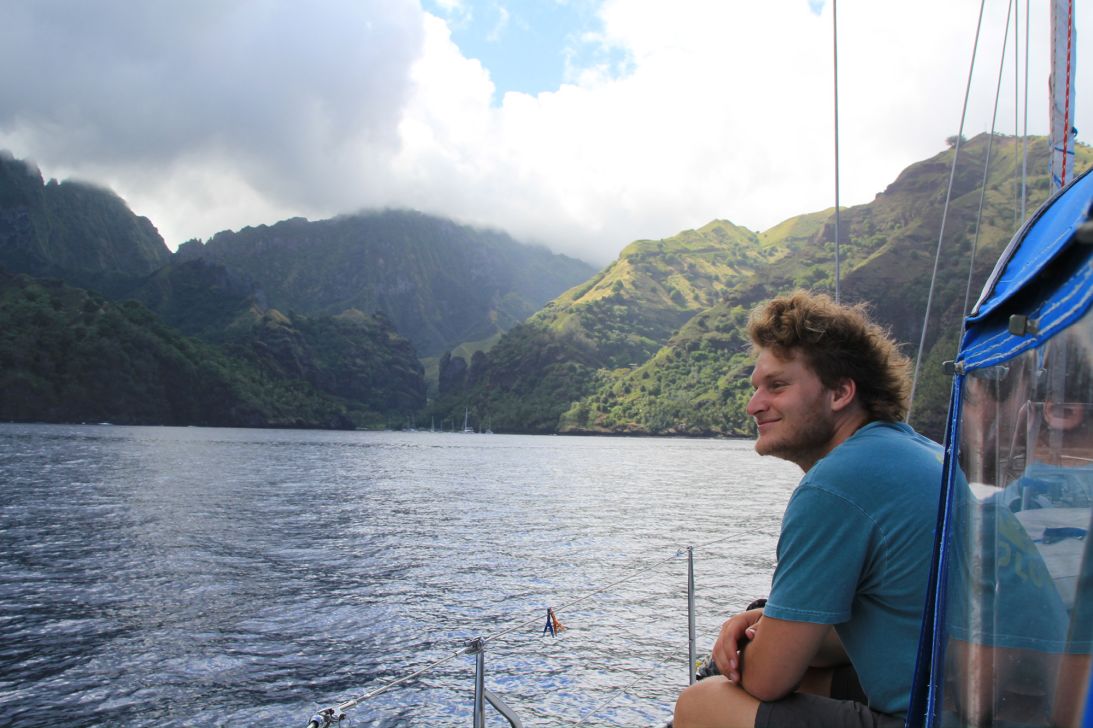
“Four heads stuck out in front of me, each one of us craning our necks over the rails of the boat and gulping in the air. We were hooting and hollering at how good it smelled,” she says.
Before stepping foot ashore, the friends popped a bottle of Champagne and Facetimed with their families and friends. The next few days were spent enjoying fresh pomelos and mangoes, feasting with a local family who served them goat (a Marquesan specialty), snorkeling on colorful reefs and hiking in the otherworldly landscapes.
Sanders acknowledges the “huge risk” that came with leaving their jobs but says there were limits to how much she felt she could be challenged at work.
“But finding challenges in something as unpredictable as the outdoors, to me, is like the maximal way that I can push myself to be better and more resilient and come back with a bigger fire,” she says. With survival on the line, she says, this voyage forced her to function at her highest potential.
Elliott says the entire adventure has made him “unflappable,” which he feels will translate in every other area of his life, too.
“After you’ve spent 12 hours from 2 a.m. to 2 p.m. upside down in the bilge, freezing in diesel to fix the engine while the boat’s rolling all over the place … the concept of someone irritating you in a meeting at work is comically trivial,” he says.
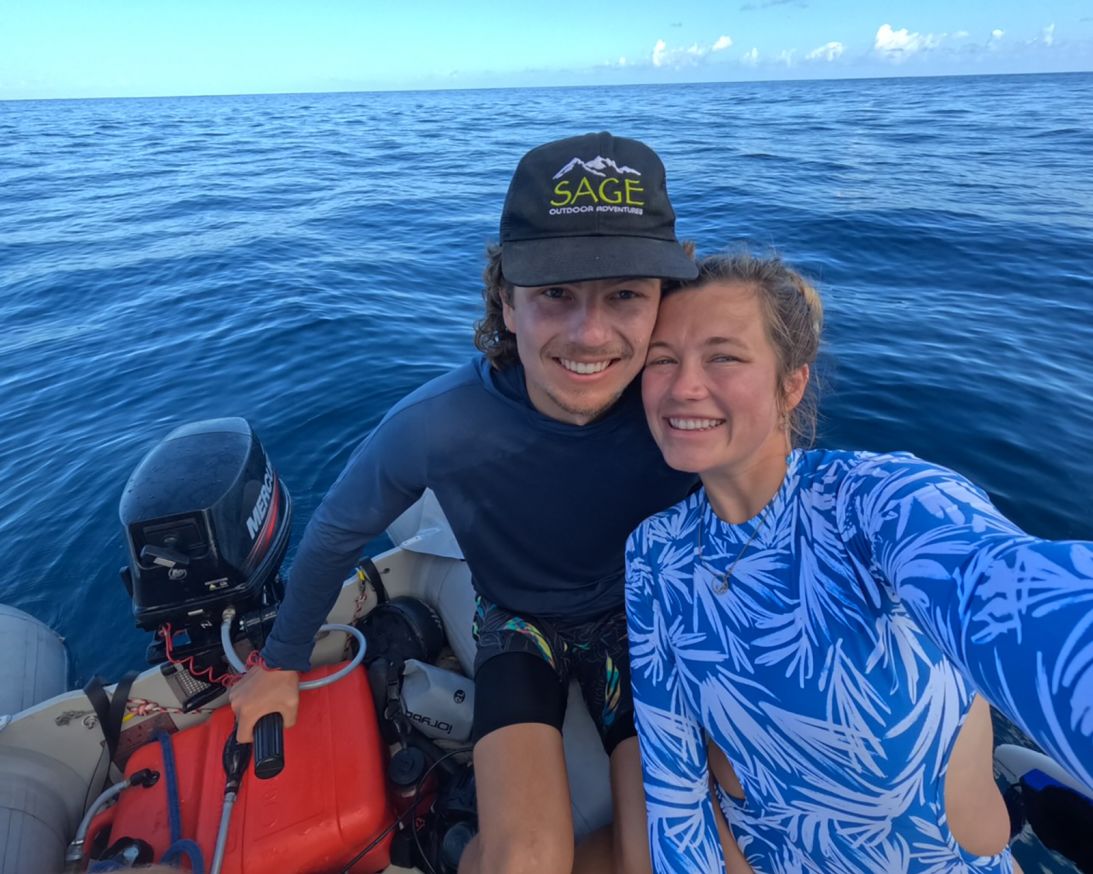
After making landfall in the Marquesas and spending some time together surfing, diving and snorkeling in the Tuamotu Archipelago to the south, too, the crew gradually dwindled to just Elliott and Sanders as the others traveled onward to chase surf in other parts of the world or head back to the office.
The couple sailed SV Open Range onward to the Society Islands and then on to Tonga, roughly 1,300 nautical miles to the west, where they arrived in early July. Next, they’ll head toward New Zealand, with a stop in Fiji along the way.
The plan is to sell the boat in New Zealand, but nothing is set in stone. The unknown is part of the adventure — and the reward.
They’ll get back to work soon enough.
“I want to come back from this trip and start the next Amazon or something,” Elliott says, adding that he’s “100 percent confident” he could find a good job, even in a bad market. But he hopes launching his own startup will keep him busy.
”The way I see this is we’re all learning so much more than we would at work right now,” he says.
Lewitt, who took a surf trip to Fiji followed by a visit to a friend in Singapore, agrees that the kind of experiences they’ve had are impossible to put a price on. And he’d do it again, he says.
“It’s going to be nice to go back, get a job and save up for the next mini retirement.“

